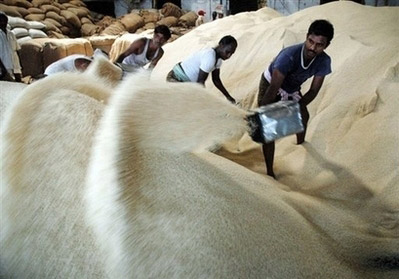Senegal's Wade says India to fully supply rice
(Agencies)
Updated: 2008-04-25 15:42
Updated: 2008-04-25 15:42
Dakar - Senegalese President Abdoulaye Wade said India would furnish the west African nation, where there have been protests against rising food prices, with its full supply of rice needs for the next six years.
 Indian workers throwing polished rice for final packing in a mill in Andhra Pradesh on April 3, 2008. [Agencies] |
Despite India restricting exports to premium long grain basmati rice on April 1, Wade said on national television that he had got New Delhi's assurance of a supply of 600,000 tonnes annually for the next six years.
"I have received a message from India's prime minister, following my request for rice supply to meet the full needs of national consumption," Wade said.
"Having consulted with his government, he told me that India will supply all Senegal's rice requirements, in other words 600,000 tonnes annually for six years."
India is the world's third largest rice exporter.
Wade added that the six-year timeframe would allow Senegal to develop rice cultivation in a bid for self-sufficiency, adding that the country's population should show "a bit of patience" ahead of stocks arriving.
There was no further detail from Dakar as to how Senegal had managed to reach such an agreement.
However New Delhi hosted an Indian-African summit on April 8 and 9 and accorded preferential status to African nations in need of rice stocks.
India on April 1 hiked the minimum export price for basmati to 1,200 dollars per metric tonne from 1,100 dollars.
Rice is one of the staples -- mostly imported -- whose prices have skyrocketed in Senegal, prompting demonstrations against the rising cost of living, themselves banned.
Wade said on Monday that there was neither famine nor hunger riots in Senegal, blaming a recent rally -- heavily cracked down on by police -- on opposition groups.
While he has said the army will protect the Indian rice, he also launched last week a plan for an agricultural revolution.
"The objective for us is to make best use of our land to satisfy our food needs from next winter onwards," he said.
The world faces a "silent tsunami" of soaring food prices, the UN food agency said on Tuesday.
|
||
|
||
|
|
|
|